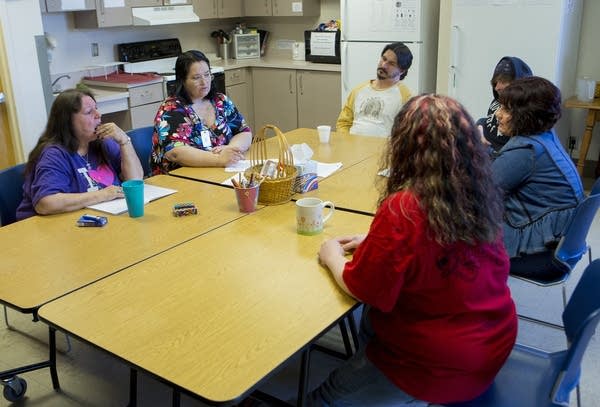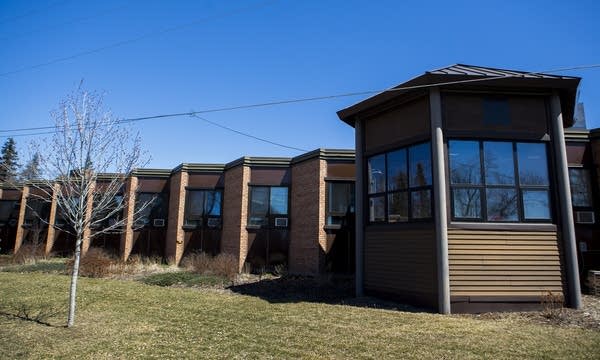Iron Range mobile team offers mental health help to go

Rick Goodman waits for the phone to ring, sitting in a squat former hospital in this Iron Range town of 3,700, a mental-health problem solver ready to dash for the black Denali 4x4 pickup truck parked outside.
He's part of a new first line of defense in this rocky, forested part of the state for people dealing with depression or bipolar and anxiety disorders that sometimes can be tangled with disabilities and addictions to alcohol, meth or heroin.
"There are more angry people out there than there used to be," said Goodman, who has years of experience in the field and came out of retirement last winter to become one of two mobile crisis team members at the Wellstone Center for Crisis Stabilization.
"There are more angry people out there than there used to be."
Team members will travel up to an hour in any direction to meet a person in the throes of a difficult mental health condition whose next stop might be a hospital bed. They offer a willing ear and, most importantly, the necessary expertise to evaluate what kind of help is appropriate — an inpatient psychiatric bed, a trip to the Wellstone Center or a return home with a follow-up appointment the next day.
Create a More Connected Minnesota
MPR News is your trusted resource for the news you need. With your support, MPR News brings accessible, courageous journalism and authentic conversation to everyone - free of paywalls and barriers. Your gift makes a difference.
The team, operating since October and one of 25 serving adults in Minnesota, is one of the newest examples of a trend. The traveling approach to mental health care is being championed by the Minnesota Department of Human Services, as well as Gov. Mark Dayton, this legislative session because it is viewed as sensitive to patient needs — sparing unnecessary hospitalizations — and also a tremendous saver of time and money.
One result is less pressure on hospital emergency rooms and a subsequent reduction in long ambulance runs to sometimes far-flung psychiatric institutions around Minnesota. Instead, more often than not, the crisis team offers on-the-spot help or brings the person to the stabilization center, part of the Virginia-based Range Mental Health Center, for a short-term stay.

"I was horrible, sick in the brain and in my heart, all over the place," said Vivian, a woman in her sixties who was picked up last month by team member Duane Dale at her apartment a half hour away. She had been awake for days and afraid to go out. Sitting at a table at the Wellstone Center, a pack of Pall Malls by her side, she said, "Now, I feel much, much better." The more she talked with Dale, "The more I felt I needed to go to that place to get Vivian back. I had lost me."
"I was horrible, sick in the brain and in my heart, all over the place."
Mostly, said Dale, people need someone to talk to. "They will calm quickly. I will do an assessment. It will take an hour maybe. I make a determination with the medical staff of, where should this person go? We are the tool to make the decision as to whether they should go to a locked facility."
Open psychiatric beds in Minnesota can be hard to find. The state closed most of its large hospitals years ago and the psychiatric units that exist are often strained, due either to an excess of patients or a dearth of staff. More than 80 percent of people seen by crisis teams like the new one in Eveleth wind up somewhere other than an inpatient bed, said Jennifer DeCubellis, assistant commissioner for the community supports administration of the Department of Human Services.

That's an expensive treatment option that often isn't needed but winds up being the default choice for emergency staff not trained in managing mental health cases. The average cost of a crisis team intervention in Minnesota was just under $700 in 2013, she said, one-tenth the cost of an average inpatient hospital stay.
Some parts of the state have no crisis team coverage and others, like the Iron Range's Wellstone service, have limited hours. "Making sure they are available 24/7 across the state is critical," DeCubellis said.
The department is pushing for more than $4 million in additional funding over the next biennium from the Legislature to expand coverage, establish training standards, and create a single, centralized crisis team phone number. The funds are included in Gov. Dayton's budget proposal, as part of a larger effort to bolster mental health services in the state.
"People recover better in their home environment with their systems intact," DeCubellis said. "It's better for individuals and communities and it ultimately saves money."

Some crisis teams respond to calls to private homes, but those tend to have enough staff to send two practitioners at a time. The Eveleth team is small, running on a shoestring budget that includes public money and insurance reimbursements as well as a $50,000 Medica Foundation grant, so, at least for now, it can send just one staffer at a time.
"The mobile crisis team takes pressure off the ER doctors."
Team members meet people in public places, like emergency rooms, a local community college and grocery store parking lots. The service is available from 8 a.m. to midnight each day, although Janis Allen, the Wellstone Center's clinical director and program manager, hopes to expand to round-the-clock service and begin handling adolescent calls very soon.
"It has always been on the back burner when we opened the center to establish this service because the need for mental health services is so spread out up here," Allen said. The team serves the towns of Virginia, Cook, Hibbing, Aurora, Grand Rapids, Ely, the Bois Forte reservation and Cotton.
In the past, nearby hospitals without the staff to diagnose or treat mental health issues simply held a person in crisis until they could arrange transport to an inpatient facility. The wait for an open bed in one of these hospitals could stretch to 18, 24 or even 36 hours. But now, hospital staff can call the crisis team, which will help determine a course of treatment.
"The mobile crisis team takes pressure off the ER doctors," said Joe Buria, emergency room and intensive care manager at the Essentia Health-Virginia hospital, north of Eveleth, who helped push for the team as part of a local mental health task force."Let's say a patient comes in," he said, "with suicidal, emotional issues or medication problems, as far as they are not taking their meds, or not affording them, or self-medicating. Prior to the team, let's say the ER doctor was having a concern about letting them go home. We would admit them to the ICU on observation status until we could get a psych bed. We would spend a multitude of hours looking for a bed across the state. Now, all of our staff are trained on using the crisis team."

While a hospital staffer might opt for an inpatient psychiatric bed out of sheer caution, the crisis team is more likely to recommend alternative levels of care. "ER doctors are not trained in mental health," said Mary Carpenter, CEO of the Range Mental Health Center. "They will err on the side of being conservative and safe and hospitalize anybody. We have professionals available to triage and give doctors some assistance on what is a course of action."
"Making sure they are available 24/7 across the state is critical."
So far, the team has handled around 80 calls in half a year. An early analysis showed that roughly a third of patients were sent to inpatient beds, a third came to the Wellstone Center, sometimes after detox, and a third were sent home. "Before," Allen said, "virtually all of those people would have been inpatient."
Rural areas contend with huge obstacles when it comes to mental health. People are isolated and disproportionately poor. They often wait longer than those in cities to seek treatment — whether because of transportation problems, a lack of health insurance, or simply the stigma associated with asking for help — and therefore are more likely to be in crisis when they do. Suicide is more common per capita in rural parts of the country, according to a recent Ohio State University study, which found rates to be twice as high among rural young people. A lack of available psychiatric services compounds all of these problems.
Keeping people in their own communities is valuable, said Shannah Mulvihill, executive director of the Mental Health Association of Minnesota. "We believe it is much more recovery-oriented to have this type of service available compared to ending up in a hospital or the back of a police car. I guarantee people would rather be at home, and getting the help they need and an appointment the next day, than in a hospital bed."
The state's mental health system is in flux, and some wonder whether Minnesota needs more inpatient services or whether it simply needs to use its 1,300 psychiatric hospital beds more wisely. "There is a lot of complexity to the hospital bed system," Mulvihill said. "It's important to use each bed the best way possible. "Until we are able to build out some of the other aspects of the system, like mobile crisis teams, to make sure only the people who really need hospital beds are getting them, it's hard to assess whether the right number is out there," she said.

Meanwhile, the crisis team in Eveleth continues to hit the road in its pickup truck. The calls can be complicated, team member Goodman said. "There is a lot of depression, and not just here." He worries about what might happen once United States Steel Corp. completes its layoff of hundreds of workers at the Minntac plant in nearby Mountain Iron this June. "What are they going to do?" he asked, knowing the answer. "Half of them will sit in bars." And that will only exacerbate any underlying emotional problems.
Recently, Goodman fielded a call from a local emergency room about a man who had come in because he was so depressed he could hardly function. He had lost his wife and couldn't get past it. His life was spiraling downward, as he skipped work and worried he'd be fired. The hospital staff wasn't sure what to do.
"I brought him here," said Goodman. "He hadn't slept. He made a friend here. He slept well." Perhaps most surprisingly, "He smiled when he left. The rewards are few and far between," he said.
"Usually you get people back to the baseline and hope you don't see them again for six months." Yet, "most of the time you know you've done something good for somebody."